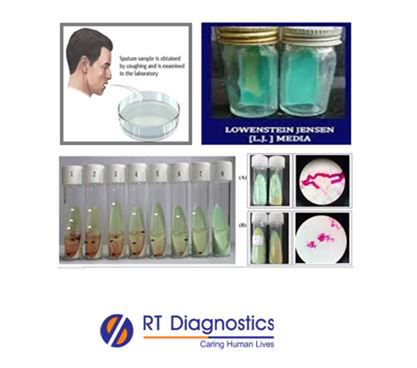Fluid for AFB test:
Why Fluid for AFB Test?
CLINICAL INFORMATION
Tuberculosis is a serious bacterial infection that mainly affects the lungs and can be spread from person to person through coughing and sneezing. Moreover from the primary site of infection which is the lungs, reactivation can spread to other parts of the body (disseminated tuberculosis) such as the brain, spine and kidneys (extra-pulmonary TB). AFB smear for mycobacteria is performed in the laboratory on specimen samples such as sputum, phlegm etc. The principle of acid-fast test is that the organisms lack lipoidal material in their cell wall due to which they easily decolourize, leaving cells colourless, then the smear is stained with counterstain methylene blue which helps in detection. Hence Mycobacterium and Nocardial species are called acid-fast because during the acid-fast staining procedure they retain primary dye carbol fuchsin despite de-colourization with powerful solvent acid-alcohol. The demonstration of Acid-fast bacillus (AFB) with auramine-rhodamine stain, Ziehl-Neelsen stain or Kinyoun stain in sample specimen is performed for screening of disseminated tuberculosis in advanced stages. The symptoms of active TB include a cough that lasts more than three weeks or more, coughing up blood and/or sputum, chest pain, fever, fatigue, night sweats and unexplained weight loss. An acid-fast bacterial culture is done to determine suspects with TB or other mycobacterium related infections. Mycobacterium tuberculi is a slow-growing bacterium that is the etiological agent for causing TB. Agar-based and egg-based media incorporating green malachite and Middlebrook broths or solid media are recommended as the Gold standard for the culture of M.tuberculosis. Antibiotic sensitivity test reveals most effective medication for appropriate sample specimen. The sample specimen is usually Intra-Vascular Fluid i.e Blood (serum/plasma) and/or body fluids. Body/Bio-Fluid Tests: Body Fluids include Peritoneal/Ascitic fluid (Ascites) – in peritonitis (inflammation of the lining of inner abdominal wall etc), Pericardial fluid, infected pleural fluid causing pleural effusion, Bronchial Wash, Drain or aspiration Fluids - Paracentesis, Thoracocentesis, aspiration of bone marrow, aspiration of amniotic fluid, JP Drain and /or blood, urine, saliva, sweat, bile fluid, seminal fluid, vaginal fluid, synovial fluid, nasal fluid, CSF, lymph, endolymph etc can provide a vital clue in the biochemical investigation of pathologies in certain disorders or disease conditions in certain differential diagnosis to arrive at a conclusive definitive diagnosis and also for prognosis.Significance of AFBon Body/Bio-Fluids test: The importance of this test lies in the detection of AFB in certain latent cases with chronic complications associated with tuberculosis. For instance, prolonged untreated cases of disseminated - widespread Tuberculosis is found to extend to many organs/organ systems causing pathological manifestations like ascites, peritonitis, pericarditis, pleural effusion etc. Therefore this fluid test is an indication advised by the physician or by the pathologist for screening and confirmation. Other tests include interferon-gamma release assay, Mantoux test, PCR etc.

General Instructions:
Sample Requirement: Specimen – Body Fluid Sample specimen (as directed by the physician or the pathologist after clinical assessment.Test Preparation: None.
NOTE - Sample for specimen collections may vary based on the patient’s condition/cases according to the patient’s presenting complaints/signs or symptoms:
SPECIMEN REQUIREMENT (Special or Rare Cases) - As instructed and guided by Physician / Clinician / Pathologist / as per Laboratory’s requirements, according to procedures and protocols.
This Multi-Specialty Clinical Referral Laboratory RTDIAGNOSTICS provides precise and accurate tests with an extensive range of testing services to the medical centres to help in the diagnosis and identification of pathology in the test specimens for infectious diseases and also to evaluate the function of organ systems of the patient. It prevents further complications and helps to stabilize and restore health to near normalcy at the earliest without delay.



